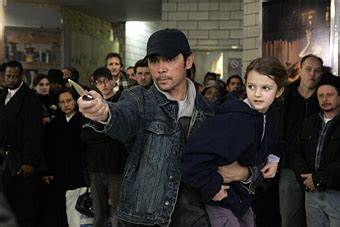LAW & ORDER: SPECIAL VICTIMS UNIT: Michele Fazekas and Tara Butters Look Back at ‘Fault’
September 20, 2019 by Marisa Roffman

Credit: NBC
LAW & ORDER: SPECIAL VICTIMS UNIT has had its fair share of truly evil characters, but in the show’s first decade, few caused as much damage to the squad as Victor Paul Gitano (portrayed by Lou Diamond Phillips).
Though Gitano didn’t have a whole lot of screen time in 2006’s “Fault,” his presence was brutal: he killed three members of a family and kidnapped the two youngest children. Because he had been following the kids for a bit, it was fairly easy for the 1-6 to figure out who their guy was…and he was a pathological liar and killer, with a history of sexual assault.
Detectives Olivia Benson (Mariska Hargitay) and Elliot Stabler (Chris Meloni) and their colleagues thought they had him in their sights, but when Gitano sliced Benson’s throat, Stabler opted to try to save her instead of rescuing one of the children. The decision had a domino effect: the boy died, Stabler took his complicated emotions out on Benson, and when the situation was flipped, she was unable to kill Gitano (who had taken Elliot hostage). Though the duo was able to stall Gitano long enough for a sniper to take him out (and rescue the young girl he had stowed away), the experience of choosing each other over the job fractured the long-standing Benson/Stabler partnership and the hour ended with her asking Cragen (Dann Florek) for a new partner.
The gripping episode was penned by Michele Fazekas and Tara Butters, their final installment for the series they spent five seasons on. (They’ve since gone on to create REAPER, AGENT CARTER, and the upcoming ABC drama EMERGENCE.) In honor of the show’s 20th anniversary, they looked back at the hour, and what their time on the series taught them…
Looking back at “Fault,” what was the genesis of that hour?
Tara Butters: You know, a lot of these episodes were actually very hard to write. One of the things that I remember about “Fault” was it was really important to create a character dynamic between Mariska and Meloni where, at each given time, we realized how important they are to each other. And so the first time when Mariska is cut with a knife by Lou Diamond Phillips’ character and Stabler has to choose, he chooses her. And that, ultimately, costs one of the children’s lives that had been kidnapped. Then later in the episode, when it’s the opposite [situation], you realize how important these two people are to each other. That was sort of the whole dynamic we were kind of trying to move the story into. SVU is often about the cases, but we wanted that episode to be very personal to these two characters.
Generally, there are some patterns SVU follows: often there are red herrings and twists, occasionally they make it to the courtroom, etc. This felt like it went a bit out of the normal format. How much of that was the plan from the start and how much of that came about as it was being broken?
Michele Fazekas: It’s interesting, we wrote 19 episodes…much more than the original LAW & ORDER, we didn’t really have to stick to any format. And Neal Baer, who was the showrunner, really encouraged that. With the original LAW & ORDER, you sort of always knew you were in for: the first half it was going to be cops, in the second half was going to be lawyers. And Neal did not need to do that format. And he would always encourage us to break format. Sometimes we would start episodes where you start with the arrest, as a first thing you see, and then the person is released. Then it’s about getting them back. It was more common to let the story dictate what the format was.

LAW & ORDER: SPECIAL VICTIMS UNIT — “Fault” Episode 19 — Pictured: (l-r) Lou Diamond Phillips as Victor Paul Gitano, Tristin Douglass as Rebecca Clifford — Photo by: Virginia Sherwood/NBC/NBCU Photo Bank
The subject matter you tackled was always serious, but was there a different approach when children were involved in the cases?
Butters: I mean, it’s probably very telling that we left after we started having children [in real life]. It was very hard to write episodes that dealt with children being harmed. And having to live in that world, and kind of to really expose the true heinous nature of those crimes, could be very hard on you. So it is kind of a roundabout way to say that it’s hard not to be affected by it. You never want to gloss over the emotions that people feel when you’re talking about a crime in which children are potentially hurt.
Fazekas: I think at the time, when you’re writing that show, because you’re often researching real cases, real people, real criminals, the way you [get by is] to tell yourself as a writer, and I think as a viewer, too, is we’re writing about the good guys getting these people. The good guys almost always win.
The nice thing about that show was you see how it affects Benson and Stabler, and how they deal with it. We were on a show for five years, and at a certain point, I was like, “I’m done, I can’t read about these people anymore.” The very next show we did was our own show, a comedy about the devil called REAPER. And I don’t think that that’s a coincidence that we went almost completely the opposite direction. Look, we’re just writing and reading about it. We’re not actually living it or anything, but it can get draining.
That absolutely makes sense. And this was also based on a real case, correct?
Butters: Yes. There was a case where a brother and sister were kidnapped and their mother was killed. And they were like hiding out at a campsite for an extended period of time. At a certain point, the little girl talked her assailant—who had already killed her brother—into letting her go. It was a very troubling case.
The show has had its share of really memorable guest stars, but Lou Diamond Phillips is up there. How did he come to be a part of the show for you?
Butters: Neal Baer was really incredible about making sure we had really interesting, known actors show up in an episode.
Fazekas: But playing a part that you would never expect to see them. And I think that was what was kind of interesting about this show is you can take somebody like a Lou Diamond Phillips—
Butters: Or John Ritter.
Fazekas: [Or] Fred Savage and put them in these roles that are so opposite [of] what you would ever think of these people. And it was just always kind of surprising. And it puts an interesting twist [on] stunt casting, where you just [traditionally] will find somebody who’s super well known and put into this role. But I think what makes it interesting is when you put them in this role that you would never originally think to put them in and see what they can do.
Butters: We were really lucky, where we had John Ritter in an episode, we had Fred Savage. We had Amanda Plummer, [who] won the Emmy for Guest Actress for our episode.
Given how truly messed up Gitano was, was there ever a version of the episode where he made it out to be a threat in the future? Or did you always know that he needed to die?
Butters: I think he kind of needed to die!
To look at the characters, this was the first, and arguably one of the biggest, shift in the Benson and Stabler partnership. When figuring out the episode, what was the process like in landing on what was the right amount to actually say about their connection versus imply?
Butters: Because they [split as] partners at the end of that episode, we knew that that was something we were building to; it felt like you needed to kind of let them emotionally go to the place where Stabler says he couldn’t not choose her because…she’s the only thing he had left in his life; his marriage had kind of started to fall apart. And they had grown so close, but we never fully go to romance. It’s just sort of the type of bonds you create as partners. But at the same time, wondering whether or not it’s healthy.
Fazekas: As much they had this lovely and fraught and complicated chemistry with each other, I never wanted to go past [that] and I think that’s okay. And I don’t think you need to. It’s funny…I read a really interesting quote about Mulder and Scully from a critic, and this is probably earlier in the [run]—Tara and I worked on X-FILES as assistants—[where] somebody said, Mulder and Scully’s relationship transcends the physical or transcends romance. And I always thought that applied to Benson and Stabler, too. The work was more important than themselves.
Which we see play out here. In the final confrontation, when it’s just Gitano, Benson, and Stabler facing off—occasionally in silence—what was the balance in what you wanted to script for the team, and how much was it the actors and director Paul McCrane figuring out those moments?
Butters: When you work with such wonderful actors like Chris Meloni and Mariska Hargitay, and you allow them to do their job, which is to convey the emotions that they feel for each other in that moment, it’s not hard. Because the thing is, those two, in real life, were such good friends. They had such a wonderful out-of-work relationship, that it was great to let them kind of expose the nature of these characters, and let them be emotional, because they’re so often about the case only. I think it was just a really nice change for them.
This was the final episode you both actively wrote for the series, but given the big impact of Olivia asking for a new partner, how much did you need or want to know about how that would ultimately shake out?
Butters: The nice thing about the show is we were so ahead of everything that you kind of were well aware of what episodes other people were writing, and this was one of the very few times there was a bit of an arc. And part of that was because of Mariska’s [real-life] pregnancy. So knowing that we had to write her out, or limit her for a period of time, we knew where the story was going, even when we wrote the episode.
Since you left the show, you’ve created and written on a number of shows. What lessons did you learn from this experience that you’ve taken to your other writing jobs?
Fazekas: I feel like every writer should work on a LAW & ORDER. It is such a great lesson in structuring stories. When you have a show that has multiple storylines, you can cut away from and jump to other storylines. In some ways, it’s a lot easier to write than when you’re on a LAW & ORDER show, you have the one case, and nothing to cut away to. And you have to design these airtight, very complicated stories. The audience is very smart; they’re going to figure stuff out. So you have to [be like,] how can we make it so that they think they figured it out, but they haven’t? How can you surprise them? And how can you get an hour-long episode that people aren’t going to see coming a mile away? So I thought that that was such a great thing for any writer just how to structure story.
The nice thing is, because it’s a LAW & ORDER show, by the time we came onto the show you weren’t going home with the cops, really. Or you very rarely did. You didn’t have a sort of soap aspect of it. But you still felt like you knew these characters, and you’re learning these characters, through how they are reacting to whatever case they’re on. And I always like where you have cases, and then you put your characters on different sides of the issue and have them all sort of hashing out their opinions. And, in a great way, you don’t make anybody dumb, you don’t make anybody wrong. Everybody has their opinion. So I always thought that was a great way to get at character without having to go home with them. I still felt like you knew Benson and you knew Stabler and you didn’t have to know who they were dating, or whatever, to really feel like you understood who these characters were. And we got to be producers on that show.
Butters: That was the other part of it. The fact is, for us, SVU was sort of like showrunner boot camp. And the fact that Neal Baer was always pushing you to be involved in pre-production, production, post-production. Because at the end of the day, he made you take ownership of your stories, which I think has helped us moving forward as writers and producers. And I don’t know that we would have been given that same opportunity on other shows.
–
As a bonus, Lou Diamond Phillips reflects on his guest spot:
RELATED:
- Neal Baer on ER and LAW & ORDER: SPECIAL VICTIMS UNIT’s Milestone Anniversaries
- EMERGENCE: Watch the First 9 Minutes of the Allison Tolman-Led Mystery
- Danny Pino Reflects on His LAW & ORDER: SPECIAL VICTIMS UNIT Run
- LAW & ORDER: SPECIAL VICTIMS UNIT: 6 Teases About Season 21
Follow @GiveMeMyRemote and @marisaroffman on Twitter for the latest TV news. Connect with other TV fans on GIVE ME MY REMOTE’s official Facebook page.
And be the first to see our exclusive videos by subscribing to our YouTube channel at youtube.com/givememyremotetv
Related Posts
Filed under Law & Order, SVU
Comments Off on LAW & ORDER: SPECIAL VICTIMS UNIT: Michele Fazekas and Tara Butters Look Back at ‘Fault’



Comments